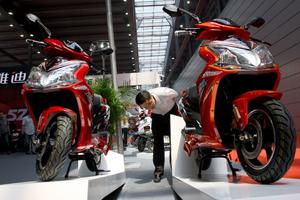 A man checks out a Yadea two-wheeled electric vehicle during an exhibition in Wuxi, Jiangsu province.[ ZHU JIPENG / FOR CHINA DAILY)
A man checks out a Yadea two-wheeled electric vehicle during an exhibition in Wuxi, Jiangsu province.[ ZHU JIPENG / FOR CHINA DAILY)
Vin Diesel made a fortune playing the American muscle-car driving anti-hero in the “Fast & Furious” films. These days, he’s helping a husband-and-wife team from the Chinese mainland get even richer selling electric scooters.
Shares of the Shanghai-based company have risen more than fourfold since a low in March, propelling the fortune of co-founders Dong Jinggui and his wife Qian Jinghong to a combined US$1.9 billion, according to the Bloomberg Billionaires Index
The actor appears as a crooning spy in ads for Yadea Group Holdings Ltd, a maker of internet-connected two-wheelers that have gained a following in the mainland, and last year opened subsidiaries in Vietnam and Germany. Demand has soared in recent months as the COVID-19 pandemic forced people to rethink their commutes.
ALSO READ: Yadea electric vehicles to expand business in overseas markets
“Everyone is afraid of the epidemic,” said Lin Xu, a Shanghai resident whose family has bought four Yadea electric bikes since December. “Almost all of us may think, ‘If we need to keep commuting, try not to travel together.’”
As life returns to some kind of normalcy after lockdowns to curb the virus’ spread, more and more people are looking for transportation options beyond a crowded bus or a subway. That should benefit the two-wheel industry, according to First Shanghai Securities analyst Xiaoxia Chen. Yadea has said that earnings for the first six months of the year will surge by at least 90 percent.
Shares of the Shanghai-based company have risen more than fourfold since a low in March, propelling the fortune of co-founders Dong Jinggui and his wife Qian Jinghong to a combined US$1.9 billion, according to the Bloomberg Billionaires Index. The stock was little changed by the midday break in the Hong Kong Special Administrative Region (HKSAR) Thursday.
ALSO READ: Cut-price electric vehicles aim to spark countryside revitalization
The company’s edge comes from its battery technology, Chen said. It uses graphene, a carbon allotrope that Yadea says can charge to 80 percent in just an hour.
A Yadea representative declined to comment for this story.
The couple founded Yadea in 2001 in Wuxi, a city of about 3.5 million people near Shanghai, after having worked at a motorcycle company for several years. They listed it in the HKSAR in 2016 and together control 67 percent of the firm’s stock.
Profit has climbed annually since 2017 and hit 516 million yuan (US$75 million) last year. The company makes 162 models of electric scooters and bikes, with 90 percent of its revenue coming from the mainland. It also exports to about 80 countries, including the US and Germany.
ALSO READ: Electric vehicles on the fast track
Yadea bikes sold for an average of 1,964 yuan in 2019, compared with more than 4,900 yuan for rival Niu Technologies, according to a Huatai Securities note this month. To meet the demand for higher-end scooters, Yadea last year introduced its G5 model that retails for about 8,000 yuan on JD.com.
Caullen Omdahl recently bought a Yadea scooter in Vietnam after he was unable to renew a driver’s license needed for one of the more common, gas-powered machines due to a coronavirus-created backlog.
“I kind of broke a few social norms by going with technology my family had never seen and a brand they’ve never heard of,” Omdahl said. In addition, “as someone who’s environmentally conscious, I was leaning toward an electric bike.”
By 2040, 77 percent of the mopeds, scooters and motorcycles sold worldwide will be battery-powered, compared with 30 percent last year, a BloombergNEF report estimated in April. Economic development will open new markets, while falling battery costs will help narrow the performance gap between electric and gas-powered bikes in three to five years, analyst Allen Tom Abraham said.
READ MORE: Charged up at pole position
In the mainland, the market for alternative-energy vehicles has ballooned over the past two decades as the government invested huge amounts of money, raising concerns about a bubble forming. The arrival of Tesla Inc this year has already forced some companies to wind down operations, and new regulation for two-wheelers designed to improve quality and prevent accidents is poised to push out cheaper and poorer-quality manufacturers.
But for now, the industry outlook is bright, said Bill Russo, founder and chief executive officer of Automobility Ltd, a Shanghai-based consulting firm. He expects the jump in sales to continue.
“Once you get used to a solo commute, you might not want to get back in to the petri dish that is the bus or the subway,” he said.


